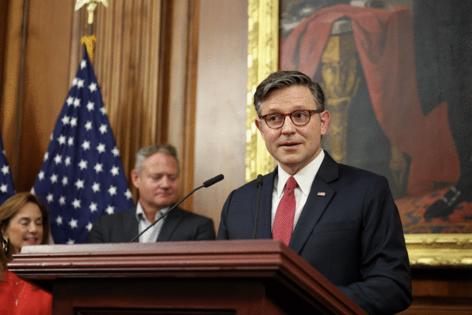Commentary: The Republican budget bill is extreme on immigration, too
Published in Op Eds
The very name of the One Big Beautiful Bill Act is both silly and revealing. The more provisions Congress crams into a single piece of legislation, the harder it is to focus public debate on any one component. So it’s worth asking: What is this big bill trying to hide?
A lot, in my view, but one of the most egregious parts is the spectacular amount of additional money it authorizes for immigration enforcement. $168 billion (1) may not seem like a lot compared to $3.7 trillion in tax cuts and $1.2 trillion in spending cuts, but it is almost a fivefold increase from current spending on enforcement.
To start with, this increased spending is not in response to an increased number of unauthorized immigrants. Those figures peaked in 2007 at 12.2 million, fell during the 2008-2009 recession, and have hovered between 10 million and 11 million ever since. It is a relatively stable population.
As the devoutly libertarian Cato Institute points out, two-thirds of all federal law enforcement spending is already allocated to immigration and border enforcement. The current level of $34 billion a year is 36 times more than what is provided for tax and financial crimes enforcement, 21 times more than funding for firearms enforcement, 13 times more than drug enforcement, and 8 times more than the FBI budget.
Meanwhile, as the deeply progressive Economic Policy Institute points out, labor law enforcement has a budget of just $2.3 billion — despite having the herculean task of protecting 170 million workers. That works out to $13.50 per worker for labor law enforcement, compared to more than $18,000 per undocumented immigrant.
This is the hypocrisy at the heart of Congress’s policy toward workers: To enforce immigration law, Congress hands over the spending equivalent of a nuclear weapon. To enforce labor law, Congress offers a slingshot.
Surely one of the rationales for having One Big (Not So) Beautiful Bill is to draw attention away from this kind of double standard. For all the talk of unauthorized immigrants needing to follow the same rules as everyone else, government spending reveals that some rules are more important than others.
The predicate question, of course, is why Congress is so eager to spend so much money on the enforcement of immigration laws, and so little on labor laws. It begins with the misconception that immigrants take jobs that should rightfully go to Americans. Sometimes this charge is directed at all immigrants, but mostly it refers to those without legal permission to be in the US.
Any economist will tell you that this charge is simply not true. As a rule, immigrants expand the economy by adding both workers and consumers to the population. It’s not as if there is a fixed number of jobs in the labor market, and they either go to a native or non-native worker.
At any rate, the US has a set of basic protections for workers, regardless of citizenship, that all employers must adhere to. It is Congress that dictates at a minimum how much workers should earn, how safe their working conditions must be, how their non-wage benefits are delivered, all while protecting their right to organize and banning discrimination and harassment.
These laws are barely enforced, if at all. Exploitative employers can and do pay workers less than the minimum wage, put workers in physically dangerous situations, employ children, withhold paychecks and refuse to pay overtime. And if there is any job an undocumented immigrant is more likely to fill, it’s one that lacks these protections.
So while it’s not true to say immigrants take American jobs, there is a two-way street between exploitative employers and vulnerable immigrants that accelerates the erosion in jobs. When employers subvert labor law, they risk a worker reporting them to enforcement agencies. But if the worker is an immigrant, especially an unauthorized one, that risk is minimized by the worker’s fear of deportation. Studies of employers who violate wage and hour laws have found that unauthorized immigrants can account for up to half of the violations, despite being just 5% of the workforce.
Employers take advantage of the vulnerability of immigrants to violate labor law, reducing job quality to such a degree that native-born workers are much less likely to take those low-quality jobs. But this logic bends to the cruel conclusion that it is immigrants’ fault. What about employers?
Which brings everything back to the One Big Beautiful Bill. Not only do the sprawling tax cuts and spending increases obscure the boondoggles and double standards Republicans don’t want voters to know about, but they also distract from any debate about policies that actually will work.
____
(1) This is the sum of spending from the Homeland Security Committee and Judiciary Committee components.
____
This column reflects the personal views of the author and does not necessarily reflect the opinion of the editorial board or Bloomberg LP and its owners.
Kathryn Anne Edwards is a labor economist and independent policy consultant.
©2025 Bloomberg L.P. Visit bloomberg.com/opinion. Distributed by Tribune Content Agency, LLC.

























































Comments